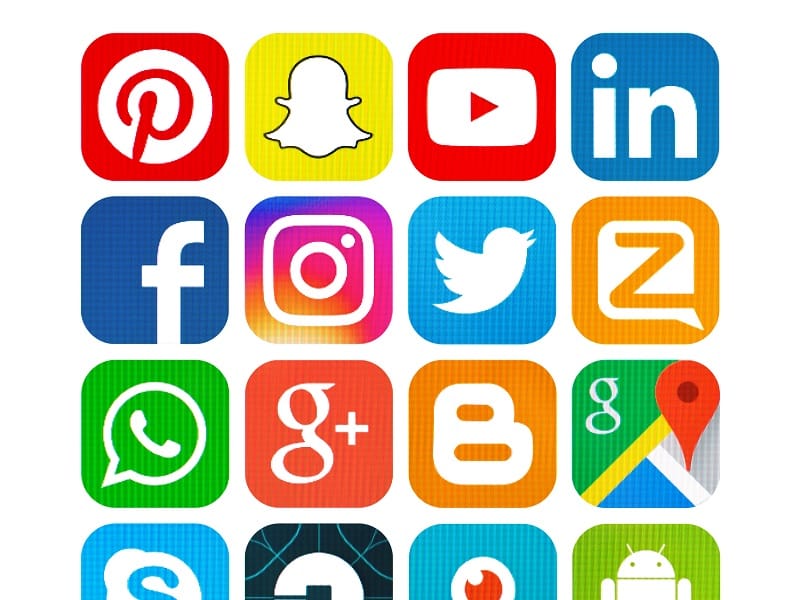Social media refers to a group of online platforms and resources that enable people, groups, and organizations to produce, distribute, and engage in content creation and exchange. It offers a way for individuals to communicate, participate, and connect electronically. Users may often create personal accounts on social media platforms, exchange text posts, images, videos, and other types of material, and engage in private messaging, likes, and shares with other users.

Some popular social media platforms include Facebook, Twitter, Instagram, LinkedIn, Snapchat, YouTube, and TikTok. Each platform has its own unique features, target audience, and purpose. While some platforms focus on connecting friends and family, others are more geared towards professional networking, photo and video sharing, or content creation.
Social media has had a significant impact on society, transforming the way people communicate, share information, and consume media. It has facilitated the rapid spread of news, allowed individuals and businesses to reach larger audiences, and provided a platform for activism and social movements. However, social media also comes with challenges such as online harassment, privacy concerns, and the spread of misinformation, which require careful navigation and management
- Communication and Connectivity: Social media platforms allow people to stay connected with friends, family, and colleagues across the globe. It enables instant communication through messaging, video calls, and comments, fostering real-time interactions and reducing geographical barriers.
- Information Sharing: Social media has revolutionized the way information is shared. It provides a platform for individuals and organizations to disseminate news, updates, and valuable content quickly and efficiently. Users can follow specific accounts or pages to receive information on their areas of interest, helping them stay informed and up to date.
- Networking and Collaboration: Social media platforms facilitate networking opportunities by connecting individuals with similar interests or professional backgrounds. It allows for the formation of communities, groups, and forums where people can share knowledge, collaborate on projects, and seek career opportunities.
- Business and Marketing: Social media has become an essential tool for businesses to reach and engage with their target audience. It offers cost-effective marketing opportunities, allowing businesses to promote their products or services, build brand awareness, and interact directly with customers. Social media analytics also provide valuable insights into consumer behavior and preferences.
- Creativity and Self-Expression: Social media provides a platform for individuals to express themselves creatively. Users can share their artwork, writing, photography, videos, and other forms of content, gaining recognition and feedback from a wide audience. This fosters personal growth, encourages self-expression, and allows for the discovery of like-minded individuals.
- Social Movements and Activism: Social media has played a crucial role in empowering social movements and promoting activism. It facilitates the rapid spread of information, raises awareness about social issues, and mobilizes support for various causes. Social media platforms have been instrumental in organizing protests, fundraising campaigns, and promoting positive societal change.
- Global Reach and Influence: Social media platforms have billions of users worldwide, allowing individuals and businesses to reach a vast and diverse audience. It enables content creators, influencers, and thought leaders to share their ideas, expertise, and perspectives with a global community, amplifying their influence and impact.
It’s important to note that while social media offers numerous advantages, it also has its limitations and potential drawbacks. It’s crucial to use social media responsibly, be mindful of privacy settings, and critically evaluate the information shared on these platforms
- Large volumes of personal data are gathered and stored by social media platforms, which makes them susceptible to security issues and illegal access. The privacy of users may be violated, which might result in identity theft, cyberstalking, or the exploitation of personal data for manipulated or targeted advertising. Online abuse, harassment, and cyberbullying can flourish on social media. significant feedback, troll attacks, and even threats can have a significant impact on a person’s mental and emotional health.
- The quick dissemination of misleading information and disinformation has been a problem on social media. Because it’s so simple to share content, false or misleading information may spread fast, causing confusion, public alarm, and a decline in faith in reputable sources.
- Social media usage has been associated with poor outcomes for mental health. Feelings of inadequacy, anxiety, and sadness can result from routinely being exposed to edited and idealized depictions of other people’s life. Social isolation and less in-person connections with others are additional effects of social media addiction.
- Social media has a strong potential for addiction, which can result in obsessive browsing, like, and commenting. This may lead to lower productivity, lack of concentration, and trouble setting priorities for your time.
- Predators may utilize social media sites to target vulnerable people, especially children and teens. Three major issues with social media use are online grooming, solicitation, and exploitation.
- A feeling of “Fear of Missing Out” (FOMO), where people feel nervous or left out if they are not continuously connected and updated on the activities of others, can be exacerbated by social media platforms.

How to earn through social media
- Influencer Marketing:
Brands may be interested in collaborating with you to promote their products or services if you have a significant following and influence on a specific social media platform. You can make money as an influencer through sponsored posts, brand partnerships, and affiliate marketing, in which you get paid a cut of any sales that come from people using your unique referral links.

- Content Creation:
You may monetize your content through a variety of channels if you are adept at producing quality and interesting material. YouTubers, for instance, may profit from ad income, brand partnerships, and item sales. Bloggers may make money through affiliate marketing, sponsored content, and advertising. Instagram users may collaborate with companies to create sponsored posts or market their own goods.
- Social Media Management:
Many companies and people need help managing their social media presence. You can work as a social media manager or consultant if you have experience in social media marketing and management. In order to do this, you must create and curate content, plan campaigns, look at stats, and manage online communities.
- Digital Products and Courses:
Digital products and online courses can be created and sold if you have specialized knowledge or skills. E-books, webinars, online tutorials, and membership websites are all examples of these. Your digital products can be effectively promoted and sold through social media platforms.
- Freelancing:
Finding freelance work can be made easier with the help of social media platforms. You can use your abilities in visual computerization, content composition, virtual entertainment showcasing, video altering, or other related fields to find clients through stages like LinkedIn, Twitter, or Facebook bunches devoted to consultants.

Facebook:
Users may establish accounts, interact with friends, and share material on the social networking site Facebook. On their profiles or in groups, users are able to submit text, images, videos, and links. They may also share, like, and comment on other people’s postings. Based on users’ connections, interests, and activity on the network, Facebook utilizes algorithms to decide what information shows in their news feeds.
Twitter:
Users of Twitter, a microblogging site, may publish brief messages known as tweets. Text, images, videos, and links can all be found in tweets. Other accounts can be followed by users, and their tweets will appear in their timeline. Additionally, Twitter employs algorithms to select material and show people relevant tweets. On Twitter, hashtags are often used to categorize and find certain subjects or discussions.

WhatsApp:
WhatsApp is a messaging app that lets users send text, voice, image, video, and document messages to other people. It is popular for individual and group conversations because it uses an internet connection to send and receive messages. End-to-end encryption is emphasized by WhatsApp, which ensures that messages are protected and accessible only to the sender and recipient.

TikTok:
WhatsApp is a messaging app that lets users send text, voice, image, video, and document messages to other people. It is popular for individual and group conversations because it uses an internet connection to send and receive messages. End-to-end encryption is emphasized by WhatsApp, which ensures that messages are protected and accessible only to the sender and recipient.

These platforms all offer opportunities for users to interact, communicate, and share material with others while having diverse features and aiming for various user experiences. Every platform has a different interface, set of algorithms, and set of community rules that control how users behave and how material is moderated.
